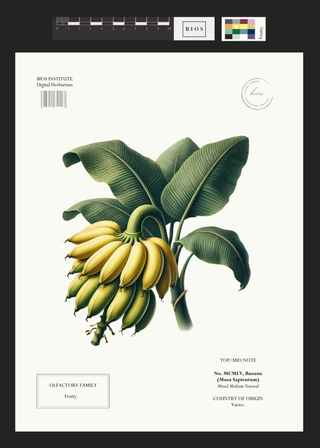

Banana (Musa Sapientum), although not commonly used in perfumery as a standalone note, can contribute to the overall composition of a fragrance. Bananas, including the popular edible varieties, are believed to have originated in Southeast Asia. Specifically, the region that encompasses modern-day Malaysia, Indonesia, and the Philippines is considered the primary center of origin for bananas. Wild banana species, such as Musa acuminata and Musa balbisiana, are native to this region.
Bananas have a long history of cultivation and domestication, dating back thousands of years. As a result, cultivated bananas have spread and are now widely grown in tropical and subtropical regions around the world. Different cultivated banana varieties have been developed and adapted to various climates and growing conditions, making bananas a globally popular fruit. Our banana is an isolate, which is a specific aromatic compound or ingredient that has been extracted or isolated from a natural source, which in this case is bananas.
The scent of banana is often described as sweet, creamy, and tropical. It carries fruity and slightly floral notes, with a hint of ripeness and a creamy undertone.
Banana can be used in perfumery to add a touch of fruity sweetness and a creamy texture to fragrances. It is often used as a supporting note rather than a dominant one. Banana can be blended with other fruity, floral, or gourmand ingredients to create unique and interesting fragrance compositions. Banana is a Top/Middle note in our library found in our Fruity family.
Banana pairs well with a variety of other fragrance notes, such as tropical fruits like mango and pineapple, floral notes like jasmine or ylang-ylang, and gourmand notes like vanilla or caramel. It can add a playful and exotic twist to a fragrance, enhancing its overall character.
It's worth noting that banana as a fragrance note may be more commonly found in niche or artisanal perfumery, where perfumers explore unconventional and unique scent combinations.
Bananas hold cultural significance in various parts of the world, and they are valued in different cultures for their symbolism, uses, and associations. Here are some examples:
Bananas are widely cultivated and consumed in Southeast Asia. They are considered an important staple food in the region and are incorporated into various traditional dishes and desserts. In some cultures, bananas are associated with fertility and are often offered as a symbol of prosperity and good luck.
In Hinduism, the banana plant is considered sacred and has symbolic importance. It is associated with the deity Lord Vishnu and is often used in religious rituals and ceremonies. Banana leaves are used as plates or serving surfaces during auspicious occasions and festivals, and banana fruits are offered to deities as a form of devotion.
Bananas are significant in many African and Caribbean cultures. They are often associated with hospitality, abundance, and celebrations. In some rituals, bananas are offered to ancestral spirits as a way to honor and connect with them. Additionally, banana leaves are used in traditional ceremonies, such as weddings and funerals, to decorate and symbolize blessings and protection.
In Chinese culture, bananas are considered a symbol of good fortune and prosperity. They are often included in festive decorations and offerings during important occasions such as Chinese New Year. The Chinese word for banana, "jiao," sounds similar to the word for "good luck," further enhancing its positive connotations.
In various indigenous cultures, especially in tropical regions where bananas are native, these fruits hold cultural significance. They are seen as gifts from nature and are often associated with sustenance, fertility, and communal well-being. Bananas may feature in traditional ceremonies, storytelling, and folklore
Banana
- Unit price
- /per
Please note this product format is a small vial that contains roughly 20 drops of scent concentrate. This can be purchased à la carte but is intended to be used with our Perfume Kit.
SCENT SPECIFICATIONS
Latin Name: Musa Sapientum
Extraction Method: Isolate
Country of Origin: Varies
All of the scents in our library our naturally derived - our collection includes essential oils, absolutes, concretes, isolates, enfleurage, macerations, oleoresins, and mixed medium naturals.
Adding product to your cart
Banana (Musa Sapientum), although not commonly used in perfumery as a standalone note, can contribute to the overall composition of a fragrance. Bananas, including the popular edible varieties, are believed to have originated in Southeast Asia. Specifically, the region that encompasses modern-day Malaysia, Indonesia, and the Philippines is considered the primary center of origin for bananas. Wild banana species, such as Musa acuminata and Musa balbisiana, are native to this region.
Bananas have a long history of cultivation and domestication, dating back thousands of years. As a result, cultivated bananas have spread and are now widely grown in tropical and subtropical regions around the world. Different cultivated banana varieties have been developed and adapted to various climates and growing conditions, making bananas a globally popular fruit. Our banana is an isolate, which is a specific aromatic compound or ingredient that has been extracted or isolated from a natural source, which in this case is bananas.
The scent of banana is often described as sweet, creamy, and tropical. It carries fruity and slightly floral notes, with a hint of ripeness and a creamy undertone.
Banana can be used in perfumery to add a touch of fruity sweetness and a creamy texture to fragrances. It is often used as a supporting note rather than a dominant one. Banana can be blended with other fruity, floral, or gourmand ingredients to create unique and interesting fragrance compositions. Banana is a Top/Middle note in our library found in our Fruity family.
Banana pairs well with a variety of other fragrance notes, such as tropical fruits like mango and pineapple, floral notes like jasmine or ylang-ylang, and gourmand notes like vanilla or caramel. It can add a playful and exotic twist to a fragrance, enhancing its overall character.
It's worth noting that banana as a fragrance note may be more commonly found in niche or artisanal perfumery, where perfumers explore unconventional and unique scent combinations.
Bananas hold cultural significance in various parts of the world, and they are valued in different cultures for their symbolism, uses, and associations. Here are some examples:
Bananas are widely cultivated and consumed in Southeast Asia. They are considered an important staple food in the region and are incorporated into various traditional dishes and desserts. In some cultures, bananas are associated with fertility and are often offered as a symbol of prosperity and good luck.
In Hinduism, the banana plant is considered sacred and has symbolic importance. It is associated with the deity Lord Vishnu and is often used in religious rituals and ceremonies. Banana leaves are used as plates or serving surfaces during auspicious occasions and festivals, and banana fruits are offered to deities as a form of devotion.
Bananas are significant in many African and Caribbean cultures. They are often associated with hospitality, abundance, and celebrations. In some rituals, bananas are offered to ancestral spirits as a way to honor and connect with them. Additionally, banana leaves are used in traditional ceremonies, such as weddings and funerals, to decorate and symbolize blessings and protection.
In Chinese culture, bananas are considered a symbol of good fortune and prosperity. They are often included in festive decorations and offerings during important occasions such as Chinese New Year. The Chinese word for banana, "jiao," sounds similar to the word for "good luck," further enhancing its positive connotations.
In various indigenous cultures, especially in tropical regions where bananas are native, these fruits hold cultural significance. They are seen as gifts from nature and are often associated with sustenance, fertility, and communal well-being. Bananas may feature in traditional ceremonies, storytelling, and folklore
